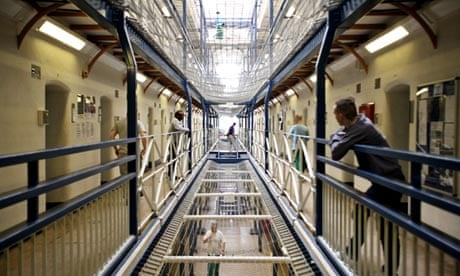Prisons in England and Wales are holding nearly 7,300 more inmates than they were designed for, according to figures released on Tuesday by the Prison Reform Trust.
Some jails had twice as many inmates as they were supposed to, the analysis of official statistics found, despite a recent slowing of the rise in prison population.
The trust argues that fewer short spells behind bars and community-based penalties are more effective at cutting crime.
It claims that last month 77 of the 131 prisons in England and Wales held more inmates than the Prison Service's certified normal accommodation (CNA) level – a measure of capacity for each jail that results in "the good, decent standard of accommodation that the service aspires to provide all prisoners".
According to the trust Kennet prison in Liverpool was the most overcrowded. Designed for 175 men, it now holds 337. In second place was Shrewsbury (built to house 170 men, holding 326) and third Swansea (built for 240, holding 436).
The prison population has been steadily rising. On 17 August it was 86,801. The same time last year it was 86,233, and five years ago it was 80,762. The average population in custody during 2002 was 70,860.
A spokesman for the trust said: "For people in prison themselves, overcrowding has a tangible impact.
"Figures for 2010/11 show that nearly a quarter of people in prison are being held in overcrowded accommodation, either doubling up in cells designed for one occupant or being held three to a cell in cells designed for two people.
"Private prisons have held a higher percentage of their prisoners in overcrowded accommodation than public-sector prisons every year for the 13 years to 2010/11.
"Overcrowding makes it much harder for staff to work intensively with offenders on resettlement. Currently 47% of adults reoffend within a year of leaving prison, rising to almost 57% for those who had served a sentence of less than 12 months. Nearly 70% of children (10-17) released from custody reoffend within a year."
Juliet Lyon, the trust's director, added: "Building our way out of the overcrowding problem is not the answer.
"The prison population can be safely reduced by curbing inflation in sentencing, calling a halt to any unnecessary use of custodial remand, dealing with addictions and investing in effective community penalties.
"Court-ordered community sentences are more effective at reducing one-year proven reoffending rates than custodial sentences of less than 12 months for similar offences.
"Rather than falling back on short, ineffective spells behind bars, investment in more intensive community sentences and public health solutions would cut crime and save the taxpayer money."
This month Lyon lambasted the policy of remanding accused in custody, saying it was clear they were often held in worse conditions and received less help and support than those convicted of a crime and serving a prison sentence.
She said the overused tactic netted nearly 55,000 people last year, 11,500 of whom were later acquitted, while many received a community penalty when their cases were finally heard in court.
A Prison Service spokeswoman said: "All of our prisons provide acceptable levels of accommodation for prisoners, although some prisons hold more people than they were originally designed for.
"We are aiming to reduce the existence of crowding alongside reducing the cost of the prison estate."
The other members of the top 10 most overcrowded prisons, according to the trust, were Leicester (which has a CNA of 200 but holds 342 men); Exeter (CNA 317, 530 men); Dorchester, Dorset (CNA 148, 242 men); Wandsworth, London, (CNA 730, 1,191 men); Northallerton, North Yorkshire, (CNA 146, 232 male young offenders); Preston, (CNA 455, 712 men); and Doncaster, (CNA 743, 1,142 men).
